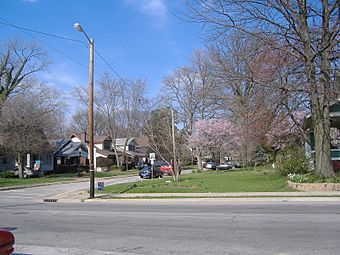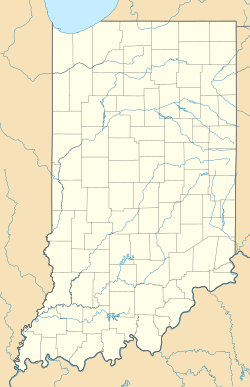DePauw Avenue Historic District facts for kids
Quick facts for kids |
|
|
DePauw Avenue Historic District
|
|

Western end of Depauw Avenue
|
|
| Location | Roughly DePauw Ave. from Vincennes St. to Abersold Dr.; 1200 blk. of Beechwood Ave.; 1211 & 1214 Vance St., New Albany, Indiana |
|---|---|
| Area | 15.5 acres (6.3 ha) |
| Architect | Spath, Adam; et.al. |
| Architectural style | Queen Anne, Colonial Revival |
| NRHP reference No. | 08000189 |
| Added to NRHP | March 19, 2008 |
The DePauw Avenue Historic District is a special neighborhood in New Albany, Indiana. It's called a historic district because its buildings and area are important to history. This district is located northeast of downtown New Albany, near the Ohio River. It mainly includes DePauw Avenue, plus parts of Beechwood Avenue and two homes on Vance Street. New Albany High School is right next to the district.
Contents
History of DePauw Avenue
DePauw Avenue is named after the important DePauw family from New Albany. The original owner of this land was Washington C. DePauw. He was a very rich banker. He made most of his money from a company called American Glass Works. By 1890, this company made two-thirds of all the plate glass in the United States. The area that is now DePauw Avenue used to be his summer home.
How the Neighborhood Grew
Washington C. DePauw's son, Charles DePauw, started planning to build homes on the land. However, the first houses were built after Charles passed away. His wife, Letitia, then took over the development. The district quickly became a popular place for wealthy families to live in New Albany.
The first four homes were built between 1906 and 1908. Four more homes were added in 1911. Most of the other houses were built in the 1920s. Building slowed down during the Great Depression. Construction finished up in the 1940s.
Architectural Styles
The DePauw Avenue Historic District has 71 main buildings. Sixty-eight of these buildings are considered "contributing." This means they help show the historic look and feel of the district. There are also 15 contributing smaller buildings, like garages.
Types of Homes You'll See
The houses in the district show many different building styles. These include:
- Colonial Revival
- Craftsman/Bungalow (39 of the 68 homes are in this style)
- Dutch Colonial Revival
- Queen Anne
- Tudor Revival
The homes on the eastern side of the district are often long. They are built to fit along a creek that runs nearby.
National Register Status
In 1994, a study looked at DePauw Avenue. It found that the area could become a National Register historic place. The National Register of Historic Places is the official list of places in the United States that are important to history.
Getting on the National Register
In 2006, the Indiana Department of Natural Resources gave money to New Albany. This money helped prepare DePauw Avenue and two other districts for the National Register. The other districts were the Cedar Bough Place Historic District and the Shelby Place Historic District.
DePauw Avenue has a similar style to Shelby Place. However, DePauw Avenue has more large homes. It also shows a greater variety of architectural styles. All three neighborhoods were officially added to the National Register on March 19, 2008.



